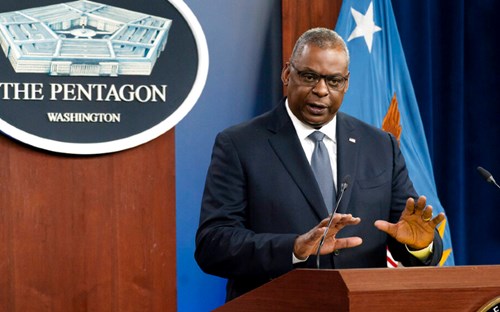The Navy this week settled a lawsuit brought by First Liberty Institute on behalf of service men and women who refused COVID-19 vaccine mandates on religious objection grounds.
As part of the settlement, service records for Navy personnel who refused the vaccine for religious reasons will now be corrected. Additionally, promotion boards for the next three years will be advised they cannot consider adverse information related solely to COVID-19 vaccine refusal in cases in which a religious accommodation was requested.
The Navy must also post a statement affirming respect for religious service members, provide more training for commanders who review religious accommodation requests, and pay $1.5 million in attorney fees.
The mission was accepted
“We had a mission to protect the careers of over 4,300 sailors that we represent," Danielle Runyan, senior counsel for First Liberty Institute, said on Washington Watch Thursday.
"We went in with a strategy," she continued, "and we came out able to protect all of their careers and allow them to continue to serve."
Military.com, an independent news website, said the settlement ends a “saga that pitted Navy SEALs and other service members against their commander in chief.”
 Citing the settlement agreement, such as naval records and promotion boards, Runyan said Navy personnel will hopefully put the harm they suffered behind them and move forward to serve their country.
Citing the settlement agreement, such as naval records and promotion boards, Runyan said Navy personnel will hopefully put the harm they suffered behind them and move forward to serve their country.
The lawsuit, U.S. Navy SEALs 1-26 v. Biden, alleged that the Navy and the Defense Department violated their First Amendment rights to religious freedom by "categorically denying" their requests for religious exemptions from the COVID-19 vaccine, Military.com reported.
The plaintiffs cited religious reasons for refusing the immunizations, objecting to the mRNA technology used to make several variations of the vaccine, citing the use of cell lines from fetuses aborted in the 1970s and 1980s to develop them. The vaccines themselves contain no aborted fetal tissue, the news outlet reported.
Defense Secretary Lloyd Austin issued a mandate on Aug. 24, 2021, requiring all service members to be immunized against COVID-19. At the time, tens of thousands of U.S. troops had contracted the illness, and 41 had died, Military.com said.
The writing was on the wall
Before the mandate was official, there was movement in that direction. There was great emphasis on getting the vaccine, and for those who had concerns, the messaging “was really negative, really punitive,” Runyan said.
It wasn’t hard to read the tea leaves, and First Liberty began preparing for what it thought could be a large number of Navy personnel seeking help with religious accommodation requests.
“We were kind of gearing up that there might have to be a lawsuit, and then we saw discrimination across the board, across the services,” Runyan said.
 The first to approach First Liberty was a group of Navy SEALs, who come from that tip-of-the-spear special operations group.
The first to approach First Liberty was a group of Navy SEALs, who come from that tip-of-the-spear special operations group.
“They came to us and said, ‘Our careers are in jeopardy, and we don’t know what to do,'” Runyan said.
First Liberty immediately first took on 35 cases.
“We got class-wide relief in March of that year and set the stage for all the other cases,” she said.
The number of individuals represented by First Liberty exceeded 4,000 by January of 2022.
Through a mostly Republican-led amendment to the 2023 National Defense Authorization Act, the Pentagon was forced to repeal its vaccine mandate.
Military Times reported in March of 2023 that 8,339 personnel across all branches were no longer in service as a result of the mandate, which wreaked havoc in the lives of many in the military. Military Times is also an independent news outlet.

“We have had people who were ready to retire who almost lost everything that they had sacrificed over the past 19 years, 20 years of their careers -- that was about to be all lost -- and we were able to protect those service members,” Runyan said.
Others reported that families were disrupted by assignments and postings that made no sense for their careers, Runyan said.
Those people still have valid claims and can seek relief, Runyan said.
Navy response could create a wave
Runyan believes there will be a ripple effect from the Navy settlement that will benefit men and women serving elsewhere in the military.
“We’ve made a significant impression on the Navy, on Navy leadership. How does that not extend to other services branches? People are taking a look at this and saying, ‘This was a settlement agreement. This was not something that the judge came out and ordered,’” she said.














